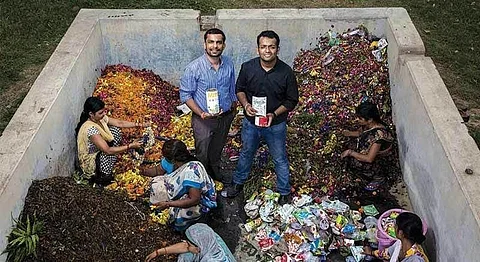
- HOMEGROWN WORLD
- #HGCREATORS
- #HGEXPLORE
- #HGVOICES
- #HGSHOP
- CAREERS
- ABOUT US
- CONTACT US

If you look at stock photos of temples next to rivers in India, you would probably see snapshots of serenity, devotion and faith. But the stark reality of toxic, polluted waters of the very river people are praying to is rarely spoken about. While there are a lot of causes that contribute to the pollution of the holy water, the large number of flowers discarded in the river as an offering to the Gods poses a unique problem. Unlike other forms of waste, the solution to this isn’t just propping up more trash cans along the banks of the river–since these flowers are an offering to the Gods, they’re considered sacred and cannot be thrown in to dustbins.
From Kanpur, Ankit Agarwal, 28, and Karan Rastogi, 29, realised that the riverbed would soon be so clogged and the water so toxic that all the benefits of living in a town next to a mighty river would be lost forever, if this went on for much longer. So, they came up with an equally unique solution to the problem of temple flowers in India’s rivers.
Both the men had encounters with environmental studies and climate change while they were pursuing different career paths. Perhaps this played in the back of their minds when, in 2012, they started researching ways to restore the river Ganga to its former glory. Having grown up in Kanpur, the river held a special place in both their hearts. Over the years they became increasingly dismayed by the over polluted state of it. However, it was while studying abroad, amidst global conversations about sustainability and green initiatives, that the idea of flower recycling started to take shape. It took 3 years of research, brainstorming, and sheer determination, but soon, the duo launched HelpUsGreen, a company that collects discarded flowers and other forms of flower waste from the river, and its surrounding temples, and recycles them into a range of products. Initially, they were met with resistance from both their families. To quit stable, respectable jobs in order to clean the rivers and recycle flowers wasn’t exactly what they had in mind for their sons, but Agarwal and Rastogi were adamant. When their first product, Mitti, came out, it was an instant success. Made out of 17 natural ingredients, including coffee residue which they collect from coffee shops waste, Mitti is a 100% organic alternative to fertilizers loaded with chemicals. Other products made with these recycled flowers are incense sticks and a kind of biodegradable styrofoam that they call florafoam.
But they didn’t stop there. Since their entire objective is to reduce waste and produce environment-friendly products, they had to find a way to make better packaging as well. They realised that incense sticks that had pictures of religious deities on them did better business, but on the flip side people were more reluctant to throw the packaging in the trash. So they made the packaging out of paper, infused with seeds.
HelpUsGreen set up their first plant on the outskirts of Kanpur. Now, with the help of seed funding to the tune of Rs. 4.2 crore from Tata Trusts’ Social Alpha, they are working on plans to open a second and third plant in Varanasi and Mathura respectively, according to Forbes India. While doing their part in eradicating environmental waste, the duo are also helping eradicate unemployment for over 80 women living in nearby villages by giving them jobs in their factories.
According to the founders, more than 80,00,000 metric tons of waste flowers find their way into Indian rivers every day. HelpUsGreen is leading by example–change begins where you want it to.
